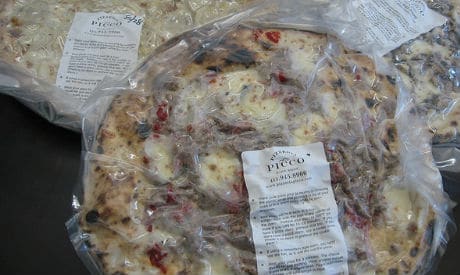
For many of us, pizza is a convenient and cost-effective way to feed our family.
But as convenient as it may be, frozen pizza is not the healthiest choice, espcially if it is the plain variety devoid of anything "green."
Well, for one woman in California, it seems she didn't get the memo.
Katie Simpson of San Diego filed a $5 million lawsuit against Nestlé, regarding the dangerous levels of trans fats in their frozen pizzas. Simpson's suit claims that the parent company of famous brands such as DiGiorno and Stouffer's is "placing profits over health" by not removing the offending fats from their frozen pizzas.
With regards to Simpson's regular consumption of the frozen pizzas, her lawyer's only defense was that her young children "love pizza" and that Simpson loves to make it for them.
It's debatable whether or not Simpson is a crusader out to rid the world of food additives or simply a woman out for a financial windfall.
But what this suit has done is to raise awareness about the way large food manufacturers continue to use proven, dangerous additives in their foods. Trans fats are now one of the most widely condemned "ingredients" in the history of food. They've been banned in restaurants in California because of their link to heart disease. They are also on our list of The Scary Seven ingredients.
Trans fats are dangerous not only because they raise your bad cholesterol levels (LDL), but because they lower our good levels (HDL) too. The combination of this decrease and increase ultimately increases our overall risk of developing heart disease.
According to the Mayo Clinic it's becoming increasingly difficult for consumers to know whether or not they're ingesting trans fats. The FDA estimates that the average person ingests 5.8 grams of trans fat daily — this translates into 2,117 grams (almost 5 pounds) of trans fats per year. This is because federal regulations allow manufacturers to list "0 grams of fat" on their Nutrition Fact labels as long as a single serving contains less than 0.5 grams of trans. This means that if you eat more than one serving, you're ingesting trans fats – even though the manufacturer may proclaim zero grams of fat on its packaging. You can identify if a product contains trans fats if it has any of the following listed in the ingredients: hydrogenated oils, partially hydrogenated oils or shortening.
 Andrea Donsky is a Registered Holistic Nutritionist (R.H.N) and co-founder of NaturallySavvy.com. Andrea has dedicated her life to sharing her passion for living a naturally and healthy lifestyle with the world, while helping to guide others through the confusing maze of 21st century supermarkets and fad diets. She is co-author of Unjunk Your Junk Food and a 'Parent Ambassador' for Healthy Child Healthy World.
Andrea Donsky is a Registered Holistic Nutritionist (R.H.N) and co-founder of NaturallySavvy.com. Andrea has dedicated her life to sharing her passion for living a naturally and healthy lifestyle with the world, while helping to guide others through the confusing maze of 21st century supermarkets and fad diets. She is co-author of Unjunk Your Junk Food and a 'Parent Ambassador' for Healthy Child Healthy World.
References: www.takepart.com/article/2013/01/31/major-frozen-pizza-maker-sued-toxic-pies?cmpid=foodinc-fb




